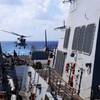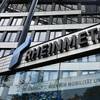Oslo-based INTERTANKO is well regarded for its work with government and international regulatory bodies in ensuring that rules and regulations pertaining to the design, construction and operations of tankers is consistent with factual data in regards to the industry's record. In the wake of the Erika disaster, Intertanko's Dagfinn Lunde has been understandably busy in meetings to ensure that ownership issues are presented. At press time, a meeting was scheduled in Brussels to discuss the tightening of rules in regards to port state control, classification directives specific to EU, and potential changes to MARPOL. The following was authored by Dagfinn Lunde, and appeared in INTERTANKO's February General Circular.
The breakup of the Erika off the French coast in severe weather on December 12, 1999 and the subsequent spillage of 14,000 tons of her heavy fuel oil cargo have prompted a reaction of a magnitude not experienced since the grounding of Exxon Valdez in 1989. The popular media had two bites of the cherry - the first when the ship sank and the second, two weeks later, when her cargo began washing up on French beaches.
For the maritime press, there has been no hiatus. The coverage has been continuous and abundant since the 24-year old ship sank. Furthermore, it shows no sign of abating. Accusations have been leveled at just about every conceivable party - from owner, classification society, flag state and charterer to port state, insurer and shipbuilder.
Once again, politicians are coming under media-generated pressure to be seen to be implementing immediate and effective measures to rid the oceans of substandard ships, while old ships are, ipso facto, being equated with bad ships.
There were definitely substandard practices associated with the Erika, and her sinking provides a number of very valuable lessons that it behooves the entire industry to learn from in order to ensure that such an incident does not happen again. However, it is also important that governments and industry do not over-react and promulgate punitive measures before the full facts of the incident are known, published and widely disseminated.
The full facts will reveal that, basically, there is nothing wrong with the current tanker safety regime other than it is not being properly enforced. There are still too many loopholes in the fabric of the enforcement regime that allow various participants in the Chain of Responsibility to cut corners and avoid meeting their obligations. Such irresponsible action penalizes the reputable players and puts the entire industry under the threat of another layer of legislation, which will still be ignored by those that choose to do so. The Erika incident provides an opportunity to identify and close the loopholes. In this way, only those that engage in substandard practices will be targeted. Sanctions need to be strong enough to deter any company, organization or agency from failing to meet its obligations.
What is evident from the Erika incident is that current ship inspection practices need to be tightened up across the board, including for older ships. Classification societies, flag and port states, charterers and owners need to review their commitments in this respect. The sinking has also highlighted the lack of transparency with respect to the availability of good ship data. The European Quality Shipping Information System (EQUASIS), established as a comprehensive ship database under the auspices of the EU Quality Shipping Campaign, is an important step forward in this respect. The system provides a means of encouraging charterers to charter vessels on the basis of comprehensive, accurate and easily accessible information, and also helps agencies and bodies charged with ship inspection work to target their efforts more effectively.
There have been many industry and government meetings over the past month at which Erika was top of the agenda, and there will be many more in the weeks ahead. It is important for industry and governments to move ahead in unison and on the basis of the true facts about the incident. Erika was an unfortunate occurrence but, on the plus side, it should provide an important springboard to significant further improvements in tanker safety.
Sponsored Content
Empowering sustAInability: could NAVTOR innovations transform maritime operations?

Charting a Smarter Course: How Nautical Systems by ABS Wavesight is Powering the Future of Fleet Management

August 2025
 Read the Magazine
Read the Magazine

 Read the Magazine
Read the Magazine
This issue sponsored by:

INSIGHTS: Will Watson, Marine Product Manager, Caterpillar
Subscribe for
Maritime Reporter E-News
Maritime Reporter E-News is the maritime industry's largest circulation and most authoritative ENews Service, delivered to your Email five times per week








